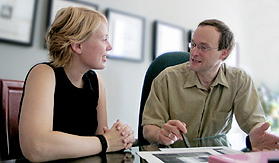Quick excerpt from a candidate interview –
“How are you given work assignments?” I asked.
“Well, I meet with the PMs on a weekly basis, just to catch up on progress completed the prior week, update them on logistics for this week. I have to coordinate with our manufacturing shop to make sure the manufactured cabinets and installation components are all coming out to staging at the right time to be installed. So, I really have to figure things out based on piecing together all these moving parts,” the candidate replied.
“How often are you given work assignments?” I pressed.
“Well, even though I recast everything on a weekly basis, I am really trying to run, believe it or not, one year ahead of schedule. In my role as project scheduler, I use a project management software to book out the jobs based on various schedules and the contracts. It’s not really my job to dissect everything, but I do it anyway, just to double-check, make sure no one is asking for the impossible. It’s only when I plan out a year, especially for some of our big jobs, that I can schedule in all the smaller jobs. Things get very fluid at times. It’s easy to get in the weeds.”
This candidate was currently in a Stratum II role. It was his job to publish details in a 60-day look forward production schedule. To do that, he had to accumulate data from several sources and coordinate people, materials and equipment. From one week to the next, there were significant changes to that schedule that required constant coordination and re-coordination. To be effective required solid S-II (Cumulative) processing.
The question on the table is potential. What is this candidate’s potential? Is it possible that the candidate has greater potential capability than is required by his current role?
I always examine the difference between prescribed duties and discretionary duties. Prescribed duties in this role required a 60-day look forward, a published schedule. As long as that 60-day schedule was published, no one had complaints.
But it’s in the world of discretionary judgment that effectiveness lives. “It’s only when I plan out a year, especially for some of our big jobs, that I can schedule in all the smaller jobs.”
“Oh, really. Tell me more,” I wondered.
“You can’t just schedule projects one after the other. Project schedules have their ups and downs. We have a committed crew on a large project, but we might get a project delay waiting for another trade to finish a segment. If that happens, I have a crew that I can temporarily shift to a smaller project. If I can do that, sometimes I can accelerate the schedule of the smaller project, knock it out and get ahead.”
As I listen to this description and ask more drill-down questions, it appears this candidate may be moving in transition from S-II (Cumulative) to S-III (Serial) applied capability. He is planning “what-if” scenarios, alternate paths to the goal, and truly working a 12-month schedule. I don’t make this judgment based on a hope and a prayer. I make this judgment based on real facts and behavior.
Potential does not live in the land of hypothetical. Potential lives in the land of discretion. How does this person make decisions? What is the Time Span of those decisions?
